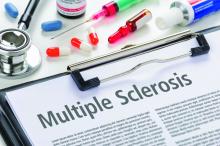according to three new case reports and series in Neurology.
The complications include acute coronary syndrome in one patient, hemophagocytic lymphohistiocytosis (HLH) in two patients, and acute acalculous cholecystitis in eight patients.
Like other MS drugs, alemtuzumab (Lemtrada) mediates inflammation by depleting peripheral blood lymphocytes. It is licensed for the treatment of relapsing MS. In clinical trials, it demonstrated greater efficacy than interferon beta-1a (Lancet. 2012;380[9856]:1819-28) and had an acceptable safety profile, although the trials noted secondary autoimmunity in 30%-35% of patients.Postmarketing surveillance aims to identify rare and late adverse events that may not be discovered during clinical trials.
The cardiac arrest incident occurred in a 24-year old woman with spinal-onset relapsing-remitting multiple sclerosis (RRMS) during alemtuzumab infusion. She had experienced two clinical relapses and a significant increase in cerebral and spinal MRI lesion load, despite previous treatment with natalizumab (Tysabri). The only striking thing about her medical history was allergic asthma.
On the third day of treatment, she developed severe asymptomatic sinus bradycardia (HR, 38 beats per minute), which resolved with treatment, and clinicians continued the regimen. The following morning, she experienced acute coronary syndrome, which later resolved.
The authors recommend that clinicians treating RRMS patients with alemtuzumab consider a baseline preinfusion ECG and monitoring heart rate at least hourly while infusion is being carried out.


